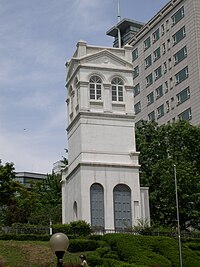Gojong's internal exile to the Russian legation: Difference between revisions
No edit summary |
No edit summary |
||
| Line 24: | Line 24: | ||
*[[Empress Myeongseong]] |
*[[Empress Myeongseong]] |
||
*[[Gabo Reforms]] |
*[[Gabo Reforms]] |
||
*[http://www.koreanroyal.org www.koreanroyal.org] About Korean Royal Armed Forces |
|||
*[http://www.thejinan.org www.thejinan.org] About The Korean Monarchy |
|||
[[Category:Joseon Dynasty]] |
[[Category:Joseon Dynasty]] |
||
Revision as of 08:59, 2 January 2013
This article needs additional citations for verification. (September 2006) |
| Gojong's internal exile to the Russian legation | |
| Hangul | 아관파천 |
|---|---|
| Hanja | |
| Revised Romanization | A Gwan Pa Cheon |
| McCune–Reischauer | A Kwan P'a Ch'ŏn |

Korea royal refuge at the Russian legation also called Agwan Pacheon in Korean, is an event in 19th Century Korean history. King Gojong of the Joseon Dynasty and his crown prince took refuge from the Gyeongbok Palace at the Russian legation in Seoul, from which they controlled the Korean government for about one year from February 11, 1896 to February 20, 1897. Their escape took place in secrecy; it was arranged by the pro-Russian official Yi Beom-jin, the Russian consul Karl Ivanovich Weber, and others.
The event, which was triggered in part by the king's fear of a coup d'état and his reaction to the murder of his wife Empress Myeongseong by the Japanese, marked a shift in Joseon politics away from the pro-Japanese reform faction and toward to the conservative faction which had been aligned with the Queen. This led to the general repeal of the Gabo Reforms.
Members of the old cabinet were killed or forced to flee, including Kim Hong-jip, Eo Yun-jung, and Yu Gil-jun. Pro-Russian and pro-American figures came to power, with Yi Beom-jin and Lee Wan-yong named to the new cabinet. Trade and resource concessions were granted to Russia, and to a lesser degree to other Western powers including the United States.
The move and associated concessions were greeted with widespread outrage within Korea, led by the Independence Club. This reaction eventually spurred the king to return to Deoksugung after slightly more than a year at the Russian embassy, and may have contributed to the declaration of the Korean Empire later in 1897.
References
- "아관파천" (in Korean). Naver/ Doosan Encyclopedia. Retrieved 2007-05-20.
- Eckert, Carter J.; et al. (1990). Korea old and new: A history. Seoul: Ilchokak. ISBN 0-9627713-0-9.
{{cite book}}: Explicit use of et al. in:|author=(help), pp. 230-232. - Template:KoDiary, National Institute of Korean History[dead link]
- Template:KoA report, National Institute of Korean History[dead link]
See also
- Empress Myeongseong
- Gabo Reforms
- www.koreanroyal.org About Korean Royal Armed Forces
- www.thejinan.org About The Korean Monarchy
